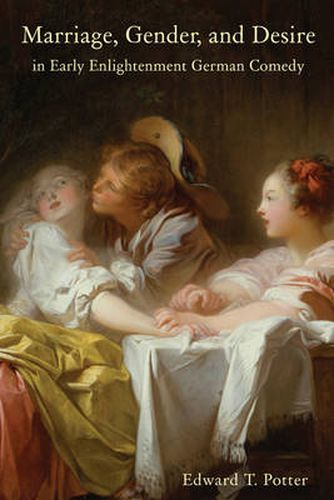Readings Newsletter
Become a Readings Member to make your shopping experience even easier.
Sign in or sign up for free!
You’re not far away from qualifying for FREE standard shipping within Australia
You’ve qualified for FREE standard shipping within Australia
The cart is loading…






J. C. Gottsched, who reformed early Enlightenment German theater, claimed for comedy the ability to transform morality. The new literary comedies of the 1740s, among the other moral goals that they pursued, propagated a new sentimental discourse promoting marriage based on love while devaluing its traditional socioeconomic foundations. Yet in comedies by well-known dramatists of the period such as Gottsched, Gellert, J. E. Schlegel, Lessing, and Quistorp,alternative gender roles and sexual behaviors call the primacy of marriage into question: there are women who refuse to be integrated into marriage, episodes of cross-dressing that foreground the culturally constructed aspects ofgender roles, instances of male same-sex desire, and allusions to female same-sex desire. Edward T. Potter examines this marital discourse in close readings of these authors’ plays, uncovering the ambiguity of eighteenth-century comedy’s stance on marriage and highlighting its resistance to the emerging discourse of the sentimental marriage. In addition to excavating the connections between the texts and norms regarding gender roles and sexual behavior, Potter also examines how these comedies self-reflexively perform their own reception in plays-within-plays that reflect upon early Enlightenment comedy, poetics, and pedagogical aesthetics and thereby comment on the efficacy of theater as a means of propagating such norms.
Edward T. Potter is Associate Professor of German at Mississippi State University.
$9.00 standard shipping within Australia
FREE standard shipping within Australia for orders over $100.00
Express & International shipping calculated at checkout
J. C. Gottsched, who reformed early Enlightenment German theater, claimed for comedy the ability to transform morality. The new literary comedies of the 1740s, among the other moral goals that they pursued, propagated a new sentimental discourse promoting marriage based on love while devaluing its traditional socioeconomic foundations. Yet in comedies by well-known dramatists of the period such as Gottsched, Gellert, J. E. Schlegel, Lessing, and Quistorp,alternative gender roles and sexual behaviors call the primacy of marriage into question: there are women who refuse to be integrated into marriage, episodes of cross-dressing that foreground the culturally constructed aspects ofgender roles, instances of male same-sex desire, and allusions to female same-sex desire. Edward T. Potter examines this marital discourse in close readings of these authors’ plays, uncovering the ambiguity of eighteenth-century comedy’s stance on marriage and highlighting its resistance to the emerging discourse of the sentimental marriage. In addition to excavating the connections between the texts and norms regarding gender roles and sexual behavior, Potter also examines how these comedies self-reflexively perform their own reception in plays-within-plays that reflect upon early Enlightenment comedy, poetics, and pedagogical aesthetics and thereby comment on the efficacy of theater as a means of propagating such norms.
Edward T. Potter is Associate Professor of German at Mississippi State University.